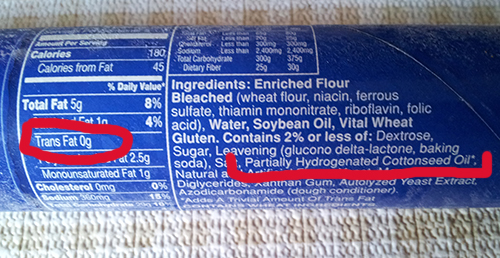Findings that PHOs can damage memory should prompt FDA to move ahead on year-old proposed ban

A lot of coverage was given this week to the University of California at San Diego study that found regular consumption of partially hydrogenated oil (PHO), the major source of trans fat in the American diet, may impair your memory —perhaps even faster than it clogs your arteries.
But there was an important question that the media failed to raise in reporting on this latest research, which was presented Tuesday at the American Heart Association’s annual meeting in Chicago. The question is this: whatever became of that “preliminary determination” made a year ago this month by the Food and Drug Administration that PHO should be removed from the Generally Recognized as Safe (GRAS) list and phased out of processed foods?
As we reported back in early September, that proposal seems to have stalled – quite possibly as a result of a backlash from the food industry. In fact, when we contacted the FDA to find out where it stood, we were told in in an email from Marianna Naum, Ph.D. of the Strategic Communications and Public Engagement Staff of the FDA’s Office of Foods and Veterinary Medicine, that “We continue to review comments to the proposal and at this time aren’t able to conjecture on date of next action.”
But if the FDA’s own estimate of 7,000 deaths a year from trans fat-induced heart attacks wasn’t enough to prompt it to take further action, maybe the results of this new study will finally provide sufficient fuel to build a fire under the agency.
The UCSD researchers tested more than 1,000 young and middle-aged men who had not yet been diagnosed with heart disease after having them fill out questionnaires about their dietary habits. The amount of trans fat that each subject ordinarily consumed could be estimated from the information they provided.
The subjects were then given a “recurrent word” in which they were asked to remember whether certain words had already been shown to them on a series of 104 flash cards. When the results were compiled, it was found that the ones who ate the most PHOs could recall 11 or 12 fewer words than their peers, even when other factors were taken into account.
Study author Dr. Beatrice Golomb, a professor of medicine at the college, described that as “a pretty big detriment to function,” given that the average number of words accurately recalled was 86. In fact, the researchers were able to estimate that every additional gram a day of trans fat consumed resulted in 0.76 fewer words committed to memory.
Now admittedly, this was only circumstantial evidence – an “association” between trans fat and memory loss, rather than direct proof. But it is Golomb’s hypothesis that trans fats do far more than damage the cardiovascular system. She considers them to be “metabolic poisons” whose energy-sapping oxidative effects can effectively put brain cells that retain memories out of commission and even cause them to die off.
Interestingly enough, what inspired the UCSD team to conduct this study was a finding that eating chocolate actually seems to enhance our ability to remember. Since chocolate is an antioxidant that ‘supports cell energy” in the hippocampus, the part of the brain most associated with memory, it caused the researchers to wonder whether trans fats, which are known to cause oxidation in cells and deplete their energy, might have the opposite effect.
Trans fat still very much a part of our diet
A quick scan of items in the supermarket this week has revealed that
many of them still contain PHOs, although most list the amount of trans
fat as zero, taking advantage of the FDA loophole that
allows .5 grams or less of trans fat per serving to be totally
discounted. Those amounts, however, can add up quickly –
particularly when multiple ‘servings” are consumed, or several items
containing PHO is on the menu.
An example of the latter could well be a Thanksgiving dinner that includes Campbell’s Cream of Mushroom with Roasted Garlic and Stove Top Stuffing, whose ingredients include partially hydrogenated soybean oil (but list zero trans fat) and Marie Callender’s Pumpkin Pie, which has so much partially hydrogenated soybean oil that it actually lists a gram of trans fat (and how about those guests who want a second piece of pie?)
Other PHO-containing items included several varieties of Nabisco cookies, such as Nutter Butter, original Chips Ahoy and “100% Whole Grain Fig Newtons”; Betty Crocker Supreme Brownie Mix and Duncan Hines Chewy Fudge Brownie mix, Hostess Twinkies (of course); several types of fruit-flavored snacks, and Tastykake Donut Holes (which oddly enough, claim to be “made fresh daily,” even though PHO is used primarily to preserve shelf life of products).
Those, and more, could add up to a pretty hefty amount of the stuff on a daily basis– enough to not only bring on heart disease, but to make you pretty forgetful, perhaps even about how much junk food you eat on any given day.
But then, as Dr. Martha Daviglus, a professor at the University of Illinois College of Medicine and executive director of the Institute for Minority Health Research, put it in regard to this latest research: “We have to be careful with what we eat because it has consequences.”
And so does the inaction of the FDA in regard to its own determination that a widely used food additive is a major hazard to the health and the lives of American consumers – one that, according to the agency’s own estimate, will have killed another 7,000 or so of them in the time since it concluded that this particular substance ought to be removed from what we eat.
Source(s):
foodidentitytheft.com